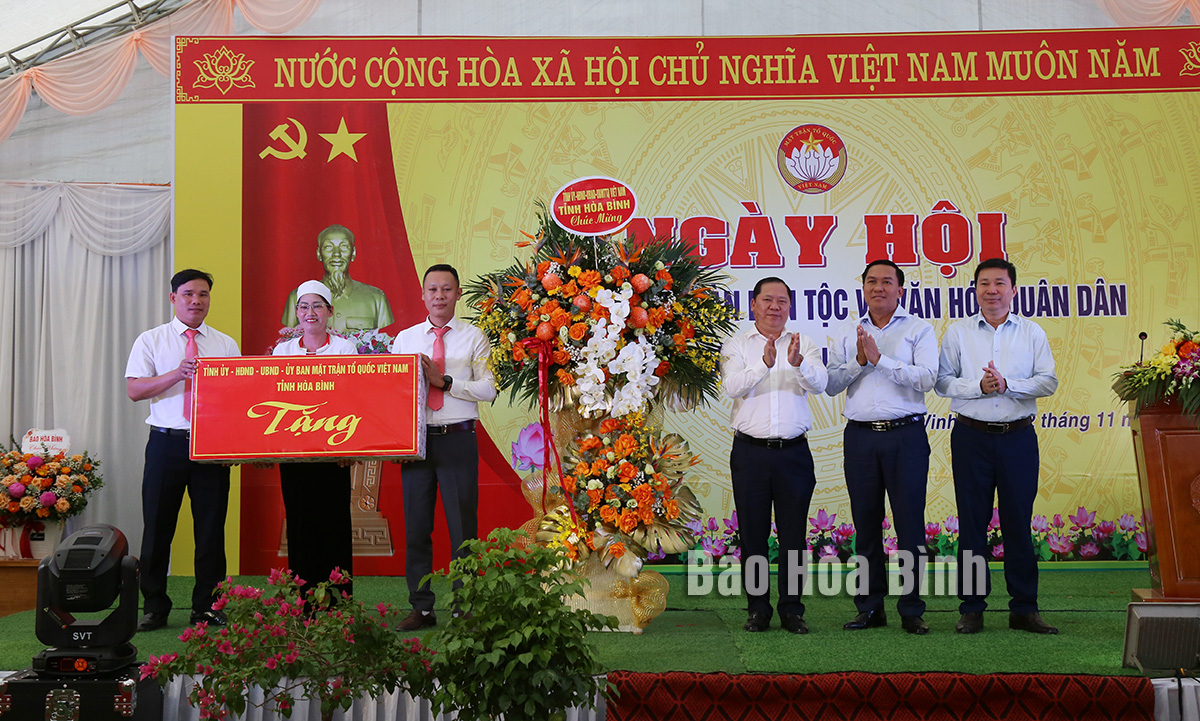
Dong Tien village, Tan Vinh commune (Luong Son), organised the 2024 Great National Solidarity Day on November 2, with Secretary of the provincial Party Committee Nguyen Phi Long attending.

Secretary of the provincial Party Committee Nguyen
Phi Long, leaders of the provincial Party Committee's Commission for
Information and Education, and the provincial Vietnam Fatherland Front
Committee present flowers and gifts to congratulate the 2024 Great National
Solidarity Day of Dong Tien village, Tan Vinh commune.
Dong Tien has 143 households with 657 people, who belong to
two ethnic groups, with Muong accounting for 85%. In 2024, officials and people
have actively responded to emulation movements and campaigns, especially the
"All people stay united to build new-style rural areas and civilised urban
areas". The average per capita income is estimated at 55 million VND
(2,160 USD) a year. The village has no poor households, and only one near-poor.
In 2022, it was recognised as a model residential area.
Speaking at the event, Long praised the results that Dong
Tien has achieved, and requested local Party committees, authorities, and mass
organisations to continue to promote the strength of great national solidarity,
and encourage all classes of people to participate in building and defending the
country in the new situation.
He stressed the need to disseminate and mobilise people to
well implement the Party's guidelines and policies, and the State's laws;
maximise all resources to promote the implementation of the Resolutions of
Party Congresses at all levels; have more specific and practical actions and
tasks to care for the material and spiritual lives of the people; well
implement the democratic regulations; and solve arising problems right at the
grassroots level.
On this occasion, the village received gifts from the
provincial Party Committee, People's Council, People's Committee, and Vietnam
Fatherland Front Committee; and outstanding collectives, individuals and
families were awarded. Additionally, three poor households in the commune received
funding to build new houses.
The Standing Board of the Hoa Binh provincial Party Committee has agreed in principle on a proposal by the Standing Board of the Party Committee of Hoa Binh city to gather feedback on the city’s 1:2000 zoning plan, which forms part of its broader urban development strategy.
Hoa Binh province has made notable progress in public administration reform and digital government development, with the satisfaction index among citizens and businesses reaching over 84%, according to recent government evaluations.
Thanks to great efforts by local authorities in recent times, the governance and public administration performance of Mai Chau district has been significantly improved.
In the afternoon of June 6, the Party Committee, the People's Council, the People's Committee and the Fatherland Front of Lac Son district solemnly held a meeting to celebrate the 139th anniversary of the district's founding (1886–2025) and the 79th anniversary of the establishment of the district's Party Committee (1946–2025). There was the attendance of Mr. Bui Van Thang, the Vice Chairman of the Provincial People's Council; Mr. Quach Tat Liem, the Vice Chairman of the Provincial People's Committee; Ms. Dang Bich Ngoc, the Deputy Head of the National Assembly Delegation of the province; as well as the former leaders of the province and district through various periods, who are the natives of the district.
Implementing the Politburo’s Resolution No. 57-NQ/TW on breakthroughs in science – technology, innovation, and digital transformation is a golden opportunity for the northern mountainous province of Hoa Binh to renew growth model, improve competitive edge and shorten digital gap.
Resolution 57-NQ/TW, issued by the Politburo on December 22, 2024, identifies sci-tech, innovation, and digital transformation as strategic breakthroughs to build a developed and prosperous nation. In Hoa Binh province, this spirit is not just a slogan, it’s being put into action through concrete initiatives that form a "new development triangle”: digital citizenship, digital economy, and digital administration.



